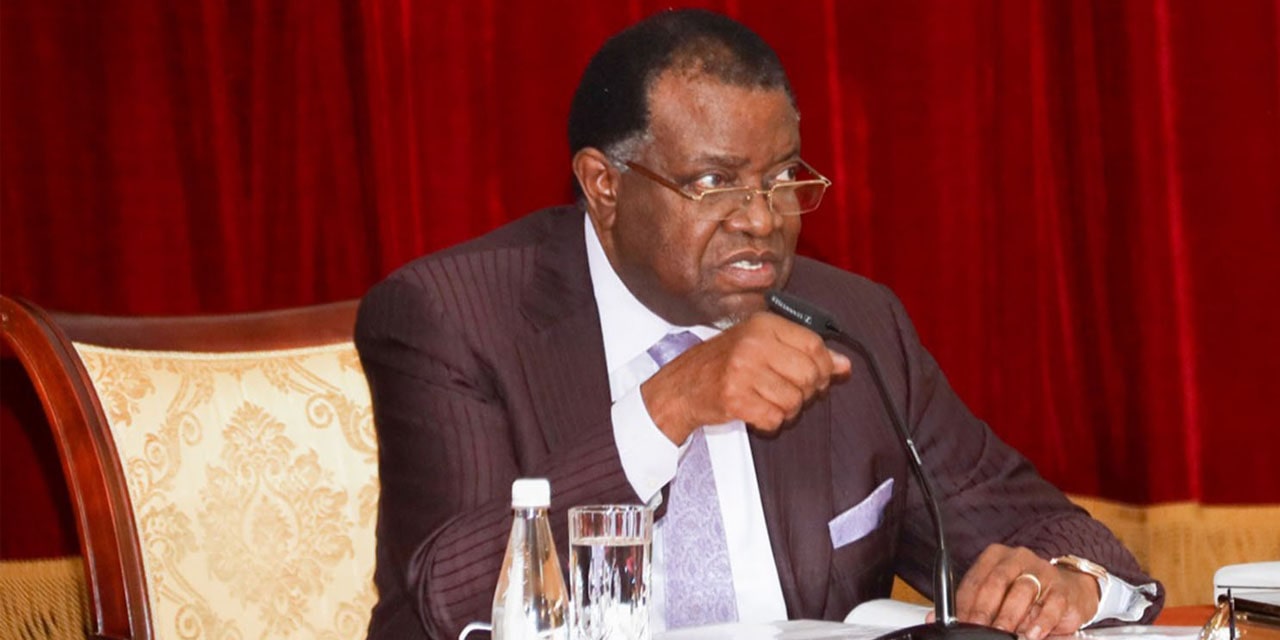Tujoromajo Kasuto
THERE is no lockdown and/or curfew restrictions as most Namibians were fearing after the President last week hinted at imposing strict measures if the situation does not improve after the outbreak of the Omicron variant in the country.
President Hage Geingob announced today at the 38th COVID-19 public briefing. No curfew, with the Ministry of Health and Social Services (MoHSS) Minister, Dr. Kalumbi Shangula stating that the reintroduction of the curfew triggers other actions, such as those related to the general hours of the operations of businesses, public transport, and the sale of alcohol.
With the new measure which will run from 15 December 2021 up to 15 January 2022, public gatherings have been reduced from 500 to 200, including burials and sporting events. Alcohol trading hours remain unchanged, but Geingob warns that this can be adjusted if the situation does not improve. The validity of PCR tests have been reduced to 72 hours for arrivals into the country. Namibians arriving with positive results with no de-isolation certificate will be subject to isolation at own cost.
Public transport measures are retained, while emphasis is placed on the enforcement of and compliance with public health measures for the duration of the journey using public transport vehicles. Shangula says restrictions on the operations of public transport at this time will create fertile ground for new infections and will thus be self-defeating as a control measure to curb infections.
President Geingob urges citizens to refrain from “unnecessary” travelling, movement and risky behaviour.
The MoHSS will avail a million disposable face masks to the Ministry of Works and Transport for distribution to travelers in public transport vehicles during the holiday season. The President also notes that Namibia is currently in the fourth wave of the pandemic as positive COVID-19 cases have been on the rise from 29 November with an 83 percent increase but 69 percent decline in death over the last 27 days.
In the past two weeks, the number of positive cases has been doubling on daily basis reaching the highest of 1 041 cases recorded on 10 December.
From 16 November to 12 December, the period of 27 days covering the current dispensations, a total of 47 130 samples were tested and 4 023 new confirmed cases were reported, giving a positivity ratio of 8.5%. This is 83% increment compared to the same period of 27 days prior.
The positivity ratio, which is the proportion of the positive cases out of the samples tested increases from 1.9% to 8.5% over the same period.
However, number of deaths inversely were low totaling thirteen (13) during the last 27 days, compared to twenty- two (22) deaths reported for 27 days prior. This represents a decline of 69%.
Minister of Justice, Yvonne Dausab, also clarifies that the fines are back during this period, affirming that individuals found without masks can be fined N$ 2000 by the authorities. Bars and establishments also face spot fines for any contraventions associated to the regulations. Establishments will also reinstitute registering patrons and wearing of masks is mandatory.
As at 13 December, Namibia has recorded a total of 133 444 confirmed COVID-19 cases, out of the 819 721 samples tested. A total of 126 148 recoveries were reported, translating into a recovery rate of 94.5%.
This is a decline of 2.7% following the increase in the number of cases reported in the last two weeks. Active cases have also drastically increased by 95.2%. There are now 3 392 active cases in the country. A grim figure of three thousand, five hundred and seventy-eight (3 578) COVID-19 deaths were recorded since the beginning of the pandemic in Namibia in March 2020.
On the vaccination front as of 13 December, a total of 388 719 persons or 25.9% of the eligible population have received the first dose of COVID-19 vaccine, and 327 532 persons or 21. 8% are fully vaccinated.
Shangula notes that one of the positive news is that the daily vaccination uptake increased by 10% from 1 900 recorded on 11 November, compared to the number of 2 112 daily average recorded as on 13 December.




